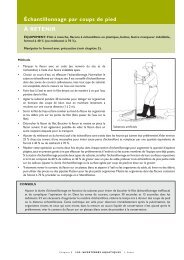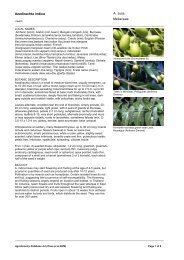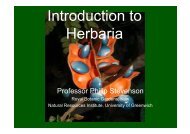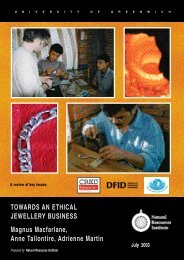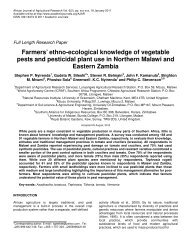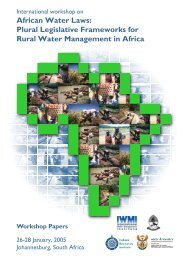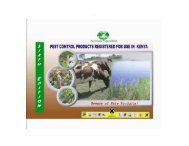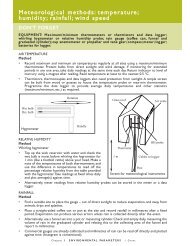botanical insecticides, deterrents, and repellents in modern ...
botanical insecticides, deterrents, and repellents in modern ...
botanical insecticides, deterrents, and repellents in modern ...
You also want an ePaper? Increase the reach of your titles
YUMPU automatically turns print PDFs into web optimized ePapers that Google loves.
Annu. Rev. Entomol. 2006.51:45-66. Downloaded from arjournals.annualreviews.org<br />
by University of British Columbia Library on 12/09/05. For personal use only.<br />
58 ISMAN<br />
of plant orig<strong>in</strong>” (73). Individual countries <strong>in</strong> western Europe show considerable<br />
variation <strong>in</strong> the <strong>botanical</strong>s they permit. For example, Hungary permits pyrethrum<br />
<strong>and</strong> nicot<strong>in</strong>e, although the latter is severely restricted. Denmark permits only<br />
pyrethrum <strong>and</strong> rotenone, Germany pyrethrum <strong>and</strong> neem. The Netherl<strong>and</strong>s permits<br />
pyrethrum alone. In spite of years of research on azadiracht<strong>in</strong> <strong>and</strong> neem <strong>in</strong><br />
the United K<strong>in</strong>gdom, this <strong>botanical</strong> has never achieved registration there, leav<strong>in</strong>g<br />
pyrethrum, rotenone, <strong>and</strong> nicot<strong>in</strong>e as the only approved <strong>botanical</strong>s.<br />
Pacific/Asia<br />
India appears to embrace <strong>botanical</strong>s more than many other countries <strong>in</strong> the region,<br />
permitt<strong>in</strong>g all of the materials (save sabadilla) mentioned here<strong>in</strong> <strong>and</strong> allow<strong>in</strong>g<br />
new products provisional registration while toxicological <strong>and</strong> environmental data<br />
<strong>in</strong> support of full registration are acquired. New Zeal<strong>and</strong> has registrations for<br />
pyrethrum, rotenone, <strong>and</strong> neem, whereas Australia has yet to approve neem <strong>in</strong><br />
spite of almost two decades of research <strong>and</strong> development <strong>in</strong> that country. Likewise,<br />
neem has yet to be approved for use <strong>in</strong> the Philipp<strong>in</strong>es, where pyrethrum is the<br />
only approved <strong>botanical</strong> <strong>in</strong>secticide.<br />
Lat<strong>in</strong> America<br />
Africa<br />
In Brazil, each state has autonomous regulatory authority. Botanicals registered<br />
<strong>in</strong> most states <strong>in</strong>clude pyrethrum, rotenone, neem, <strong>and</strong> garlic, although nicot<strong>in</strong>e<br />
<strong>and</strong> extracts of native plants are used to a small extent (J. Vendram<strong>in</strong>, personal<br />
communication). Throughout Lat<strong>in</strong> America plant oils <strong>and</strong> extracts are produced<br />
by cottage <strong>in</strong>dustries on a small scale <strong>and</strong> used outside of any regulatory system<br />
on a regional basis (D. Badulescu, personal communication).<br />
Data on regulated <strong><strong>in</strong>secticides</strong> are not readily available for most African countries.<br />
Among <strong>botanical</strong>s, only pyrethrum is approved for use <strong>in</strong> South Africa. As <strong>in</strong><br />
Lat<strong>in</strong> America, numerous crude plant extracts <strong>and</strong> oils are likely <strong>in</strong> local use <strong>in</strong> the<br />
poorer countries.<br />
Trends <strong>and</strong> Changes <strong>in</strong> Registration<br />
Given the ongo<strong>in</strong>g negative perception of pesticides by the general public, government<br />
response to that perception, <strong>and</strong> <strong>in</strong>creas<strong>in</strong>g documentation of environmental<br />
contam<strong>in</strong>ation, it is hard to imag<strong>in</strong>e pesticide regulators eas<strong>in</strong>g toxicological requirements<br />
for new pesticides, with the possible exception of certa<strong>in</strong> plant oils<br />
<strong>and</strong> extracts widely used <strong>in</strong> human foods. Globalization of agricultural commodities<br />
will serve only to tighten restrictions on pesticide use <strong>in</strong> develop<strong>in</strong>g countries<br />
where fresh produce for export to wealthier countries is an important source of<br />
revenue. All produce imported <strong>in</strong>to the European Union, United States, <strong>and</strong> Japan<br />
(for example) must comply with pesticide regulations <strong>in</strong> the respective import<strong>in</strong>g



